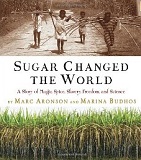
 Sugar Changed the World
Sugar Changed the WorldA Story of Magic, Spice, Slavery, Freedom, and Science
Reviewed April 17, 2011.
Clarion Books, Boston, 2010. 166 pages.
Starred Review
2011 Sonderbooks Standout: #7 Children's Nonfiction
I have two more books to review from School Library Journal's Battle of the Kids' Books. At least two that I've read. I also have two holds that have just come in for books that I decided to read because of the coverage in the Battle.
Sugar Changed the World was knocked out in the first round, but it was up against the eventual winner, so that loss was no disgrace. Judge Adam Rex had some glowing things to say about it:
SCtW is my kind of history book. Relatively uninterested in kings and politicians, this is more of a Howard Zinn-style people’s history, albeit one which far more gently grinds its axe. Christopher Columbus gets mentioned, for example, on three separate pages. The longest passage by far is only fifty-seven words. Readers will learn far more about Olaudah Equiano, an enslaved African taken to Barbados to work in sugar, or even Thomas Thistlewood, a white overseer who wrote with a kind of nauseating jocularity about the cruelties he inflicted on his charges. They’ll also learn about the university of Jundi Shapur, which flourished fifteen hundred years ago in what is now Iran and which sounds so wondrous I can’t believe I’d never heard of it before. They’ll learn that the “whitest and purest” sugar of the ancient world came from Egypt of all places. Suddenly those sugar cube pyramids we all built in grade school are elevated above the level of busywork to some kind of totemic historical metaphor.
It would be easy to call this a bitter book about a sweet spice, and there are unquestionably some difficult truths in Sugar Changed the World. There were also, for me, odd moments of pride–it was interesting to discover that the slave trade was focused so heavily in the Caribbean and South America, for example, and when I learned that only four percent of the slaves taken from Africa ended up in North America, and that these slaves had a comparatively low death rate, I chanted the feeblest U-S-A of my life. So why did I come away from this book inspired? A section on Gandhi didn’t hurt. Likewise sections on new (to me) heroes like the Haitian leader Toussaint, and English abolitionist Thomas Clarkson, a contemporary of William Wilberforce. This is an ultimately hopeful book, and I hope it finds a place in the classroom.
Excellent period illustrations and photos abound, including sample pages from a grim old children’s picture book that painstakingly details how sugar got from the West Indies to your sweet shop, and unintentionally details everything that was wrong about the Victorians. The back matter of SCtW contains a great set of appendices that include, among other things, a timeline, a web guide to additional images, and an essay aimed at parents and teachers that explains how the book was researched.
I had already purchased a copy of this book for myself. The reason was another blog from School Library Journal, Heavy Medal. They had a Mock Newbery committee vote among their online followers -- but they wanted people to vote only if they'd read the books on the shortlist. My library didn't have a copy of Sugar Changed the World, so I ordered myself a copy, and was not sorry. If I had read it in 2010 (I didn't; I read it after the New Year.), I would have included a category in my 2010 Sonderbooks Stand-outs for Children's Nonfiction, because this book is outstanding.
This is children's nonfiction at its finest. And highly recommended reading for adults as well. You've got a huge topic -- how sugar changed the world -- and the authors cover it with great depth and good documentation, and they bring in the personal element, making it memorable. Any reader, child or adult, will come away from this book having learned a lot. But these aren't dry, dull facts. You will be fascinated by what you learn.
I like the way the authors talk about looking at their own family histories and discovering how each of them was hugely affected by, of all things, sugar. They are not exaggerating when they say this is a story of Magic, Spice, Slavery, Freedom, and Science.
